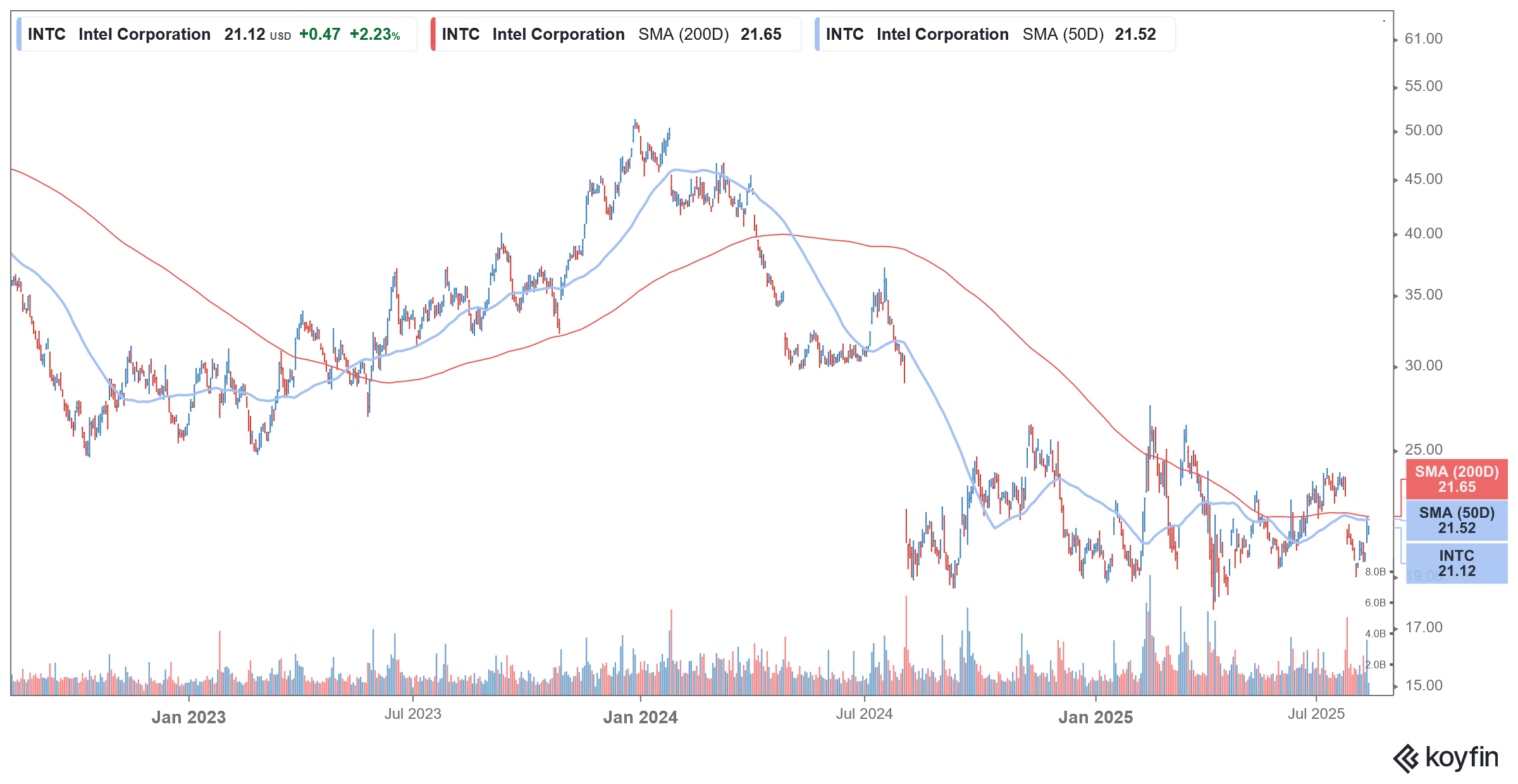Intel Stock Rises as Trump Calls CEO Lip-Bu Tan a “Success”
Please note that we are not authorised to provide any investment advice. The content on this page is for information purposes only.
Intel stock (NYSE: INTC) is trading higher today after the meeting between the company’s CEO, Lip-Bu Tan, and President Donald Trump. Following that meeting, Trump, who had recently called for Tan’s “immediate” resignation, termed him a “success.”
I met with Mr. Lip-Bu Tan, of Intel, along with Secretary of Commerce, Howard Lutnick, and Secretary of the Treasury, Scott Bessent,” said Trump in a post on Truth Social. The President added, “The meeting was a very interesting one. His success and rise is an amazing story. Mr. Tan and my Cabinet members are going to spend time together, and bring suggestions to me during the next week.”
Intel Stock Rises After Trump Meets Tan
Intel also confirmed the meeting and said, “Tan had the honor of meeting with President Trump for a candid and constructive discussion on Intel’s commitment to strengthening U.S. technology and manufacturing leadership. We appreciate the President’s strong leadership to advance these critical priorities and look forward to working closely with him and his Administration as we restore this great American company.”
Trump Had Previously Called for Tan’s Resignation
Trump’s praise for Tan is nothing short of a U-turn, as days before, he called for his resignation. Trump said that Tan is “highly CONFLICTED” and that there is “no other solution to this problem.”
Trump’s comments come shortly after reports said that he is pushing Taiwan Semiconductor Manufacturing Company (TSMC) to acquire a 49% stake in Intel.
Also, this extraordinary intervention into a private company’s leadership was preceded by a letter sent by Senator Tom Cotton to Intel’s chairman. Cotton’s letter expressed serious concerns over Tan’s extensive business ties to Chinese firms, with some allegedly having links to the Chinese People’s Liberation Army (PLA).
Tan, a veteran of the semiconductor industry, was appointed as Intel’s CEO in March, a few months after the previous CEO Pat Gelsinger abruptly resigned. Tan’s past role as the head of Cadence Design Systems, a company that recently pleaded guilty to selling products to a Chinese military university in violation of US export controls, has also been a point of scrutiny.
Tan Is Working to Turnaround Intel
Intel is currently undergoing a significant corporate restructuring strategy that includes global layoffs to streamline operations, cut costs, and boost efficiency. This effort is aimed at making the company leaner and more competitive in the fast-changing semiconductor market. The measures have generally been received positively by the markets as they are seen as a necessary step for Intel to regain its footing.
Tan is working on a long-term plan to turn around Intel, which is now a pale shadow of its glorious past.
A lot went wrong with INTC over the last two decades. It made the strategic blunder of turning down the offer to supply processors for the Apple iPhone. The company believed that Apple might not be able to sell enough of these, and it was a tiny market to bet on.
Intel was quite slow with innovation, and AMD gradually took its market share in the PC market. Apple, too, stopped using Intel chips for its Mac and instead pivoted to its own chips.
Intel Pivoted to Foundry Business
Intel was pivoting to the foundry model and was looking to manufacture chips for other companies.
While Intel had outlined ambitious plans for Intel’s foundry business, it has failed to attract third-party customers even as pure-play foundries like Taiwan Semiconductor Manufacturing Company have seen their order books swell amid the AI pivot.
In a July filing with the SEC, Intel said it may “pause or discontinue” its foundry business if it is not able to secure customers.
“We have been unsuccessful to date in securing any significant external foundry customers for any of our nodes, and our prospects for securing a significant external foundry customer for Intel 14A are uncertain,” said Intel’s filing.
Credit Rating Agencies Downgrade Intel
Intel stock is trading near multi-year lows. The burgeoning losses in the foundry business have weakened Intel’s balance sheet, which had over $44 billion in debt at the end of Q2. Credit rating agencies have also taken note of the company’s woes, and recently, Fitch downgraded Intel’s credit rating by one notch while assigning a negative outlook on the chipmaker.
It joins credit rating peers S&P Global and Moody’s, which have previously downgraded the Santa Clara, California-headquartered company’s credit rating.
The ratings and Outlook reflect a more challenging demand environment than previously anticipated, which is constraining profitability growth,” said Fitch in its note.
It added, “Credit metrics remain weak and will require both stronger end markets and successful product ramps, along with net debt reduction over the next 12-24 months, to return EBITDA leverage to levels consistent with the ratings.”
Wall Street analysts have also been bearish on Intel stock, and most rate it as a hold.
Intel Is a Crucial Piece of US Manufacturing
Meanwhile, Intel is far more than just a chipmaker; it’s a critical component of US manufacturing, economic strength, and national security. As the only leading-edge semiconductor company in the US that both designs and manufactures its own chips, Intel plays an irreplaceable role in the domestic technology ecosystem. This position has become even more vital as the US seeks to re-shore critical manufacturing and reduce its reliance on foreign supply chains.
The ability to manufacture advanced semiconductors domestically is a strategic imperative for the US. Chips are the essential building blocks for virtually all modern technology, from personal computers and smartphones to military hardware and artificial intelligence systems.
It is a crucial piece for US manufacturing, especially as demand for AI chips skyrockets amid the artificial intelligence (AI) pivot.






